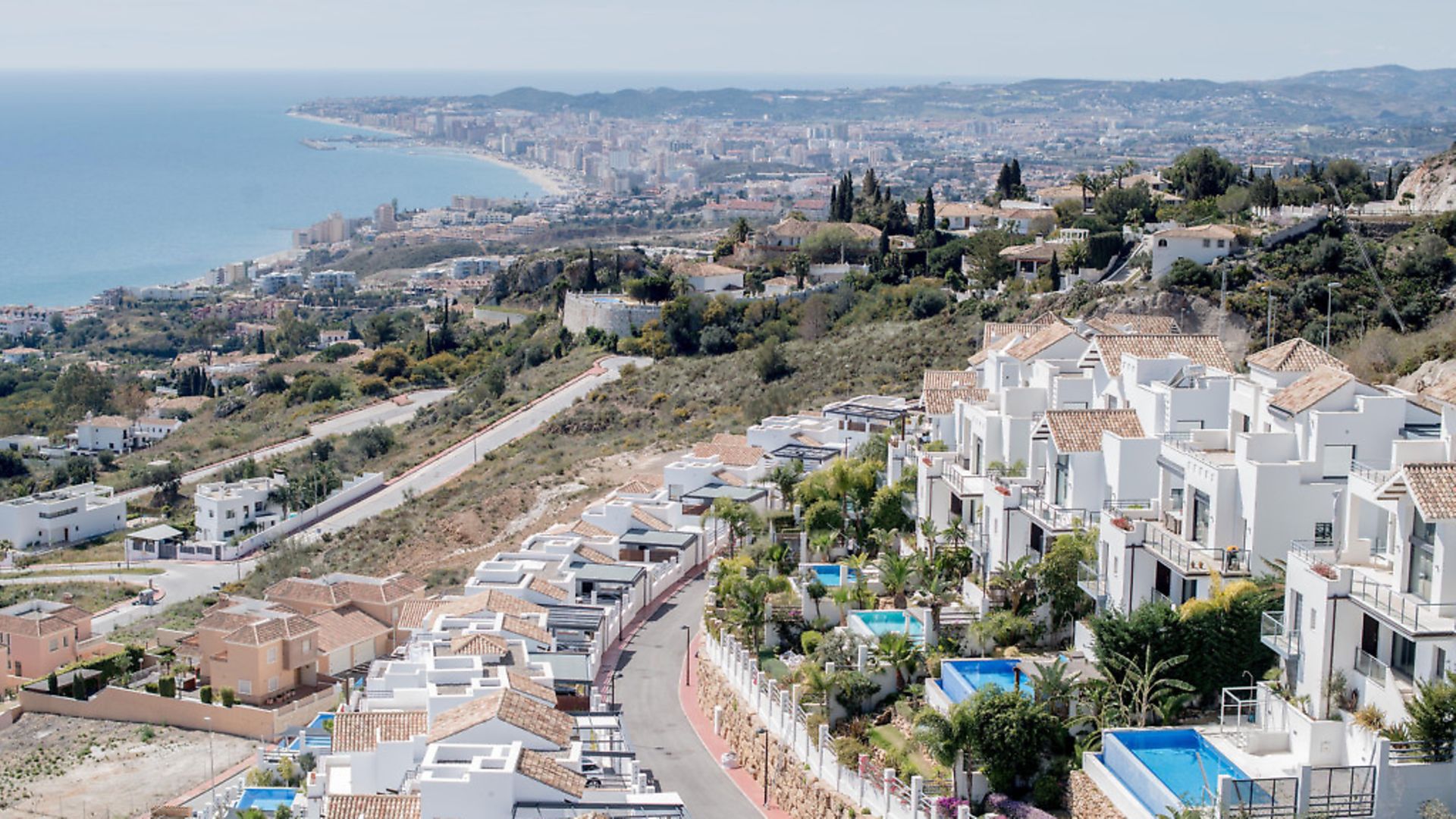
JOE WALLEN visits expat communities in Spain to speak to the individuals perhaps most vulnerable of all to a no-deal Brexit.
It is a typically tranquil winter afternoon at the Chambao de Vicente restaurant.
Its rustic terrace spills out onto the golden sands of the Playa La Herradura, a beach running parallel to the small Spanish Costa del Sol town of the same name.
The clientele is a mix of both immigrants – British, Germans and Swedes – and Spaniards, their jovial laughter perforating the sound of the nearby rolling waves.
Yet, once lunch has been cleared, the sleepy restaurant wakes with a jolt as a group of British diners gathers to unfurl a European Union flag.
‘We want to stay with you!’ whoops one woman.
‘Yes,’ exclaims another, ‘Bollocks to Brexit!’
The good-natured gang are received well by other patrons, many of whom rush over to be photographed with the Brits.
The group are members of Bremain in Spain, an organisation set up in the wake of the Brexit referendum in June 2016.
Bremain in Spain not only campaigns for the UK to Remain but also lobbies British, Spanish and EU politicians to protect the rights of British immigrants in Spain.
Membership of the group has swollen over the last few months to include more than 5,000 activists with the increase attributed to concerns that Brits in Spain have been all but forgotten by Theresa May. A number of other worried groups exist across the country.
Just the day before the lunch in La Herradura, the Brexpats in Spain organisation held two public meetings in the towns of Benalmadena and Mijas.
‘We had two informative public talks on the coast, both attended by more than 200 worried Brits,’ explains Sharon Hitchcock, a volunteer for Brexpats in Spain.
‘During our meetings we have found that there are a lot of confused people who are finding the whole process quite overwhelming.’
More Brits call Spain home than any other country in the EU27 – 310,000, although this figure is thought to be as low as a third of the actual number, with temporary residents, dual nationals and those not registering with the Spanish authorities making up the rest.
However, their very future hangs in the balance as the likelihood of a no-deal Brexit increases by the day, and while the catastrophic impact that such an eventuality would have on the UK has been widely discussed, less attention has been focused on their fate.
Deborah Gray, 48, set up a PR company in Barcelona, 13 years ago. She currently employs 30 people in Spain and Portugal.
‘I came out here in 2001 and I cannot find out from anyone what my status will be after Brexit,’ she says.
‘I hear that it is looking likely that I can stay but in what circumstances for me and my company?
‘In the small hours of the morning I lie awake thinking what if someone took it all away?
‘My company has a £2 million turnover but I have no status, no-one can tell me anything, there are no answers out there. I just feel so angry about it all.’
Gray’s career shows just how inaccurate the stereotype of the typical expat can be. Many emigrants rail at the British media’s misunderstood coverage of their lives – typically portraying them as sunburnt beach bums, spending their idle days sipping San Miguel and playing bowls.
In reality, two-thirds of Brits in Spain are employed, according to John Moffett, the vice-chair of Bremain in Spain.
Rebecca Wey, 39, who lives in the town of Oliva near Valencia, also has heightened concerns about how she will provide for her family in the event of a no-deal Brexit.
‘I’ve been living in Spain for almost 20 years and have been working for the same online marketing company, which is based in London, for 10 years,’ she says.
‘One of my biggest concerns, being a single parent to two children that I support from my wages, is that I’ve always been paid in pounds and these days [it’s worth] less and less every month.
‘Since last summer it has just been decreasing rapidly and I’ve got to the point now where I’ve had to take a second job to cover the shortfalls because Brexit has affected the exchange rate so drastically.’
The plummeting pound is also a major concern to British pensioners in Spain, who make up 25% of the emigrant population. They have seen the value of their pensions in Spain drop by up to a quarter over the last two years.
On my visit, many told me they were being increasingly forced to choose between essentials, such as new clothing and heating their homes, to make ends meet.
‘If the pensioners at home had lost as much income that we have because of the fall in the pound they would be rioting outside Downing Street,’ says Eunice Bowles-Roberts, 75, who lives in Alcaucín with her husband Ronald.
There is also uncertainty whether those who have made pension contributions in the UK and Spain will still be able to receive both when they retire.
Another major concern for the elderly is the potentially life-changing loss of the free healthcare that they currently receive in Spain under its S1 form policy.
‘It would be unbelievably bad if we were to lose access to this free healthcare,’ says Karen Watling, 72, who lives on the Costa Blanca.
‘Without it we would have to take private healthcare and because my husband has previous health conditions that would blow us out the water financially.’
In addition, British emigrants to Spain are likely to lose the freedom of movement that permitted them to move to, live and work in the country.
Sajid Javid, the home secretary, has confirmed that freedom of movement for non-UK EU citizens will end ‘deal or no deal’. While the European Commission has asked member states to adopt a ‘generous approach’ in protecting the rights of UK citizens living in their countries, the Spanish government has yet to confirm how or if this will occur.
Maya Middlemass, 47, runs the marketing company BlockSparks from the Costa Blanca. The uncertainty over whether she would be able to register and continue to run her business in Spain in the event of a no-deal led her instead to obtain an e-license in Estonia. (The Baltic state was the first place in the world to offer an e-residency policy – allowing EU nationals to set up a business registered in the country without actually living there).
‘But, even if Spain remains welcoming and accommodating to its British population, will I be free to travel to a third country, even if I am e-resident there?’ she says.
‘It’s a terrible situation with no certainties, making planning impossible – for my business, family travel or my daughters’ future higher education.
‘As the future of work becomes more global and distributed, the country of my birth seems set on retrograde isolationism – making us a laughing stock on the world stage in business as well as politics.’
Back in La Herradura, others are taking even more drastic measures to protect themselves.
So concerned about losing her right of free movement and furious at a lack of effort from Downing Street to safeguard her rights in Spain, Valerie Lawrence, 67, pictured left, is one of many willing to give up their British passport to obtain Spanish nationality.
‘Politicians are not doing anything for expats, we are being completely ignored,’ she says.
‘They [the EU and Spanish government] don’t want to hurt us but for the British government we are just collateral damage and they can use our discomfort as another axe against the EU. They have forgotten we exist.’









